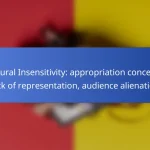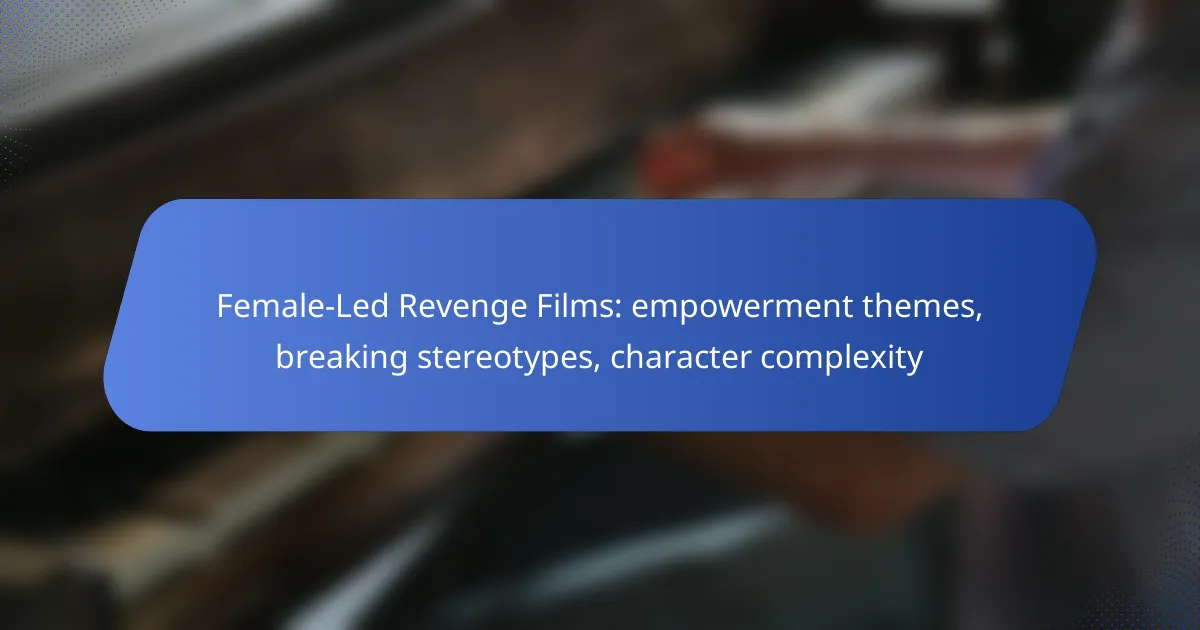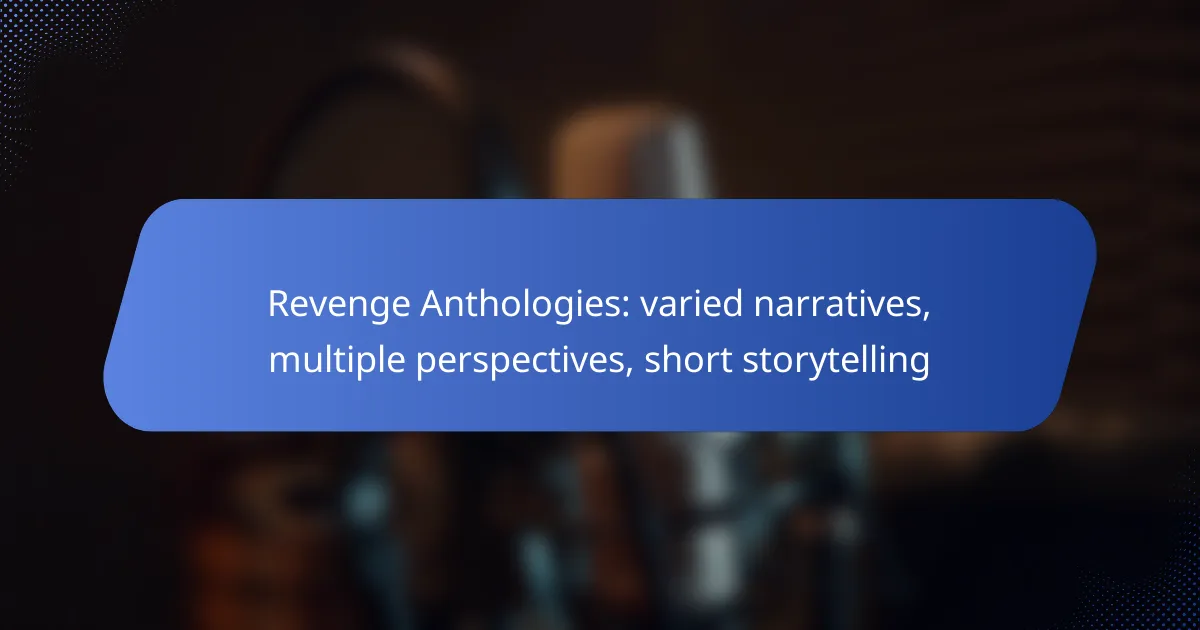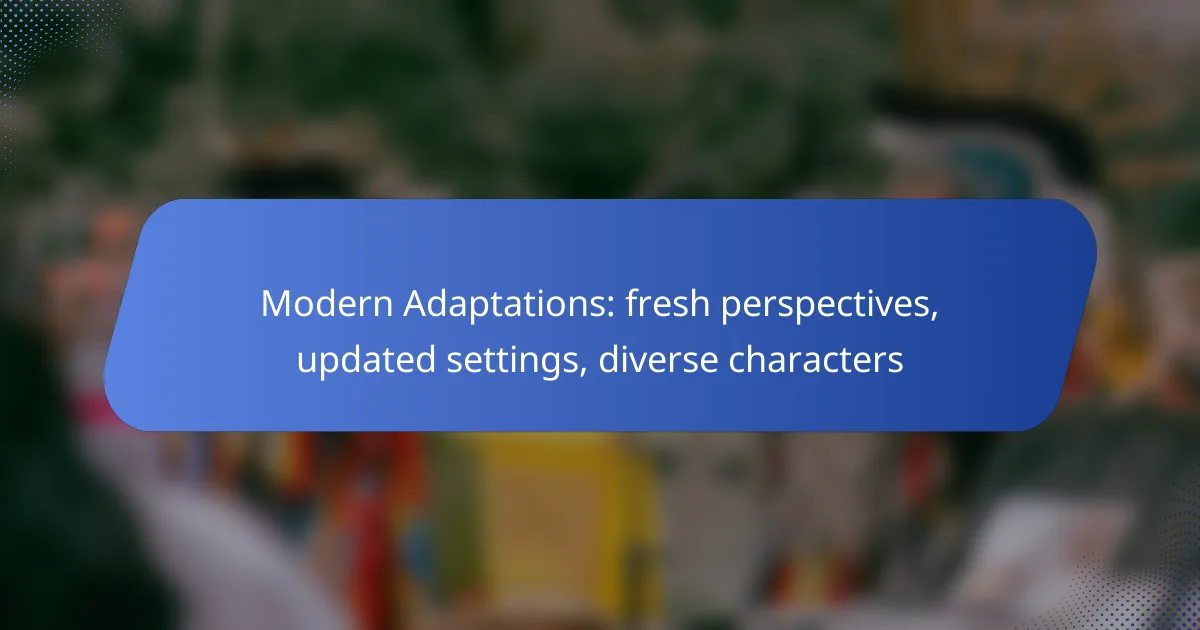Female-led revenge films serve as a powerful medium for exploring themes of empowerment and justice, featuring strong, complex characters who defy societal stereotypes. By showcasing women’s resilience and capacity for transformation, these narratives invite audiences to engage with deeper questions about gender roles and personal agency in the pursuit of retribution.

How do female-led revenge films empower women in Canada?
Female-led revenge films empower women in Canada by showcasing strong, complex characters who challenge societal norms and stereotypes. These films often highlight themes of resilience, strength, and solidarity, allowing female audiences to see themselves in powerful roles and narratives.
Challenging traditional gender roles
Female-led revenge films actively challenge traditional gender roles by presenting women as protagonists who take control of their destinies. Instead of being passive victims, these characters often become active agents of change, defying expectations and societal norms.
For example, films like “The Brave One” and “Peppermint” depict women who seek justice on their own terms, illustrating that female characters can possess the same drive and determination typically reserved for male heroes. This shift encourages viewers to reconsider preconceived notions about gender and power.
Highlighting resilience and strength
These films emphasize resilience and strength by portraying women overcoming significant obstacles and trauma. The journey of the protagonist often involves personal growth, showcasing their ability to rise from adversity and fight back against their oppressors.
In Canadian cinema, films such as “Revenge” and “The Girl with the Dragon Tattoo” highlight female characters who endure hardship yet emerge stronger. This representation fosters a sense of empowerment among viewers, inspiring them to confront their own challenges with courage.
Promoting female solidarity
Female-led revenge films often promote solidarity among women, illustrating the importance of support networks in overcoming adversity. These narratives frequently feature female characters who unite to achieve common goals, reinforcing the idea that collaboration can lead to empowerment.
For instance, in films like “Widows” and “Thelma & Louise,” the bond between women becomes a source of strength, showcasing how shared experiences can lead to collective action. This theme resonates with audiences, encouraging a sense of community and shared purpose among women in real life.

What are the key themes in female-led revenge films?
Female-led revenge films often explore themes of empowerment, justice, and personal transformation. These narratives challenge traditional stereotypes by showcasing complex female characters who seek retribution while undergoing significant self-discovery.
Justice and retribution
Justice and retribution are central themes in female-led revenge films, where protagonists often take the law into their own hands. This quest for justice highlights the inadequacies of legal systems, particularly in cases of gender-based violence or discrimination. Films like “Kill Bill” and “The Brave One” illustrate how these characters confront their oppressors to reclaim their power.
In these narratives, the pursuit of justice is not just about revenge; it often serves as a catalyst for personal empowerment. The characters’ journeys reflect a broader commentary on societal injustices, making their actions resonate with audiences who may feel similarly marginalized.
Identity and self-discovery
Identity and self-discovery are crucial elements in the arcs of female protagonists in revenge films. As these characters navigate their quests for vengeance, they often confront their pasts and redefine their identities. This journey can lead to profound transformations, as seen in films like “Monster” and “The Girl with the Dragon Tattoo.”
The exploration of identity is frequently intertwined with themes of trauma and resilience. Characters emerge not only as avengers but also as individuals who have learned to embrace their strengths and vulnerabilities, offering viewers a nuanced portrayal of female empowerment.
Morality and ethics
Morality and ethics play a significant role in shaping the narratives of female-led revenge films. These stories often pose challenging questions about the nature of justice and the consequences of taking revenge. Characters grapple with the moral implications of their actions, creating tension between their desires for retribution and the ethical dilemmas they face.
Films like “I Spit on Your Grave” and “Promising Young Woman” illustrate how these moral conflicts can lead to unexpected outcomes. Audiences are prompted to reflect on the complexities of right and wrong, making these films not just tales of vengeance but also explorations of deeper ethical questions.
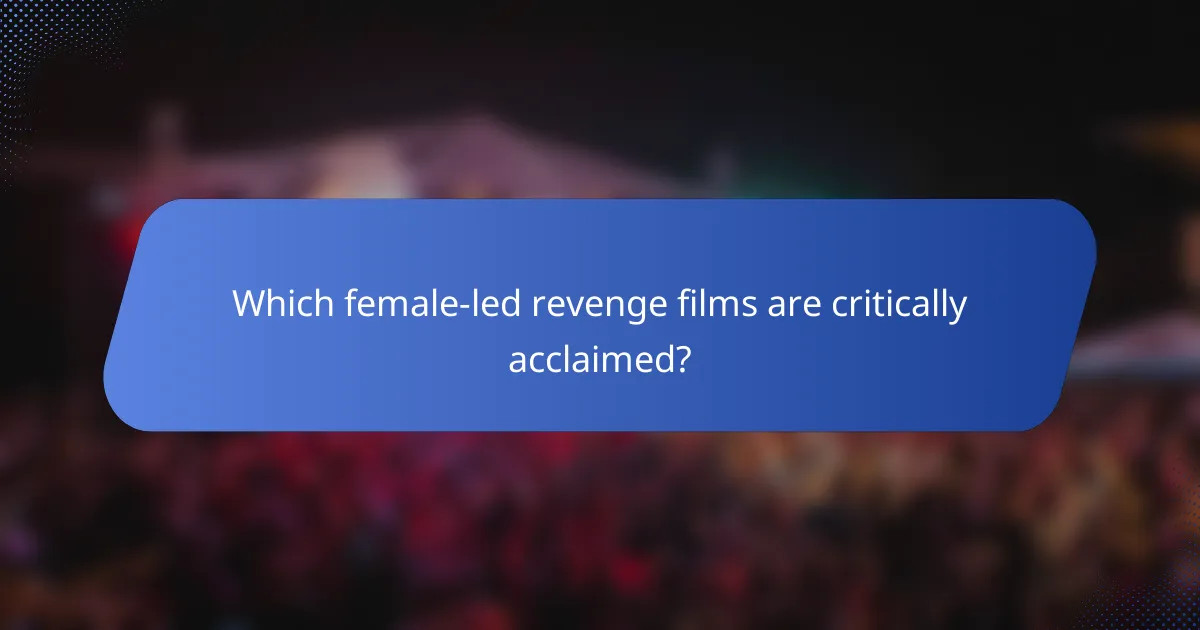
Which female-led revenge films are critically acclaimed?
Critically acclaimed female-led revenge films often explore themes of empowerment, challenge societal stereotypes, and present complex characters. These films not only entertain but also provoke thought about gender roles and justice.
“The Brave One” (2007)
In “The Brave One,” Jodie Foster portrays Erica Bain, a woman who becomes a vigilante after surviving a brutal attack. The film delves into her psychological transformation as she grapples with her desire for revenge and the moral implications of her actions.
This film stands out for its exploration of trauma and empowerment, showing how Erica’s journey reflects the struggle many face when seeking justice. The emotional depth of her character invites viewers to empathize with her plight while questioning the nature of vengeance.
“Kill Bill” series
The “Kill Bill” series, directed by Quentin Tarantino, features Uma Thurman as The Bride, a woman seeking revenge against those who betrayed her. The films are notable for their stylistic violence and strong female lead, showcasing a blend of martial arts and revenge-driven narrative.
These films break stereotypes by presenting a female protagonist who is both powerful and flawed. The Bride’s journey is marked by intense action and personal growth, challenging traditional gender roles in the action genre.
“Promising Young Woman” (2020)
“Promising Young Woman,” starring Carey Mulligan, centers on Cassie, a woman who seeks to avenge her best friend’s assault. The film cleverly critiques societal attitudes towards consent and accountability, using dark humor and suspense to engage the audience.
This film stands out for its unique narrative structure and thought-provoking themes, making it a significant entry in the genre. Cassie’s complex character embodies the struggle for empowerment while highlighting the consequences of seeking revenge in a world that often overlooks women’s experiences.

How do these films break stereotypes?
Female-led revenge films break stereotypes by presenting women as complex, powerful characters who challenge traditional gender roles. These narratives often highlight themes of empowerment, showcasing women’s strength and resilience in the face of adversity.
Complex character development
In female-led revenge films, character development often transcends simplistic portrayals of women. Characters are typically multi-dimensional, grappling with their motivations, fears, and moral dilemmas. This complexity allows audiences to connect with them on a deeper level, making their journeys more relatable and impactful.
For instance, films like “Kill Bill” and “The Brave One” depict protagonists who evolve through their experiences, illustrating growth that challenges the notion of women as mere victims. This nuanced development invites viewers to empathize with their struggles and triumphs.
Subverting male gaze
Female-led revenge films frequently subvert the male gaze by shifting the focus from male desire to female agency. This approach allows women to reclaim their narratives, presenting their stories from their perspectives rather than through the lens of male characters. By doing so, these films challenge the objectification often seen in traditional cinema.
Examples include “Promising Young Woman,” where the protagonist’s actions are driven by her own motivations rather than seeking approval from male characters. This shift not only empowers female characters but also encourages audiences to reconsider how women are portrayed in film.
Redefining femininity
These films often redefine femininity by portraying strength, vengeance, and assertiveness as integral aspects of female identity. Rather than conforming to stereotypical roles, female characters embody a range of traits that reflect their individuality and resilience. This redefinition challenges societal norms about what it means to be a woman.
For example, in “Mad Max: Fury Road,” Furiosa is depicted as a fierce warrior, showcasing that femininity can coexist with power and aggression. Such portrayals inspire a broader understanding of femininity that encompasses a spectrum of characteristics beyond traditional expectations.
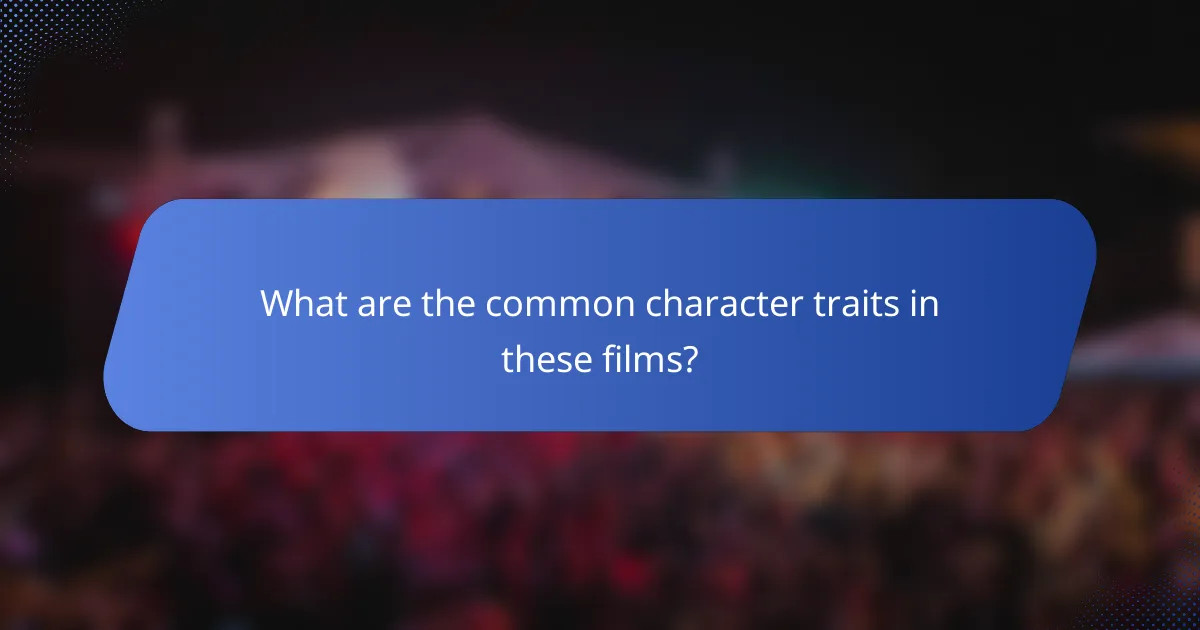
What are the common character traits in these films?
Female-led revenge films often feature characters who embody strength, resilience, and complexity. These traits not only empower the protagonists but also challenge traditional stereotypes associated with female roles in cinema.
Resourcefulness and intelligence
Characters in female-led revenge films frequently demonstrate exceptional resourcefulness and intelligence. They often devise intricate plans to achieve their goals, using their wits to outsmart adversaries. For example, a protagonist might leverage her knowledge of technology or psychology to manipulate situations in her favor.
This resourcefulness is often portrayed through clever dialogue and strategic thinking, showcasing that intelligence is a powerful tool in overcoming obstacles. Viewers are presented with characters who think critically and adapt quickly, reinforcing the idea that women can be both cunning and capable leaders.
Emotional depth and vulnerability
Emotional depth and vulnerability are crucial traits in female-led revenge films, allowing characters to resonate with audiences on a personal level. These protagonists often confront their past traumas, which adds layers to their motivations and actions. This emotional complexity makes their journey more relatable and impactful.
By showcasing vulnerability, these films challenge the notion that strength must be devoid of emotion. Characters may experience moments of doubt or fear, yet they ultimately channel these feelings into their quest for justice. This blend of strength and vulnerability creates a compelling narrative that empowers viewers and fosters empathy.




